Following my research using Ancestry, I had a lot of questions about the Spradleys to answer. I had started a big puzzle and using Ancestry, I was able to create what I would consider a border of the picture. I knew the names, dates, and general family structure of the Spradleys. What I was missing was the middle of the puzzle – real, concrete details about the Spradleys’ lives. Now, it was time to fill in that middle by focusing on their connection to Dickinson College and the campus.
After an in-class discussion with my professor and classmate, I decided to pursue a few specific topics. First, I wanted to trace where exactly on campus the Spradley family had lived. Did they live alongside students? Secondly, I was interested in a newspaper article I had come across in my Ancestry research. It was a parody letter written from the perspective of Henry (Williams) Spradley by Dickinson students.
Just like the rest of the nation, these Dickinson students had used exaggerated misspellings, a minstrel type of
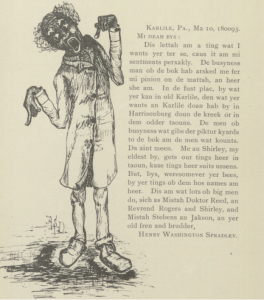
“Spradley cartoon letter.” Microcosm (1893-94).
tone, and cartoonish features to parody Black people, and in this specific case, Spradley. Was this a trend to make fun of Spradley, or a one-off?
In all, I had a lot on my plate, and I was hoping the College Archives would have some of the many, many, many answers I was looking for.
Before finding any of these answers, I decided to create a timeline of sorts for my own note keeping purposes. By creating this, I was able to list some of the important events in the lives of the Spradley family in an easy to read, accessible way. These events came from my previous Ancestry research as well as the new newspaper articles my professor had provided me. The highlighted text signifies further work needs to be done. In this case, researchers in the future need to compare more historical records of Mina Spradley’s death in order to determine her death location.
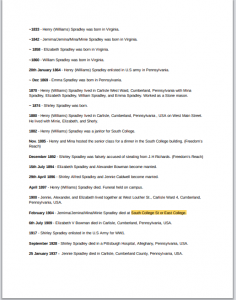
Timeline, created by James van Kuilenburg.
I begun with the Archives’ online search engines of the Microcosm and the Dickinsonian. Going year by year, I began with a group of words: Spradley, Sprad (a nickname for Henry), Shirley, South College (the building where his family lived), janitor (in order to get accounts of janitor life not specific to Henry), negro, Black, and Shirley. Through using these words I found a plethora of articles, poems, letters, and tidbits of information.
I learned more information about South College or should I say South Colleges. I had wrongly assumed there was only one South College in the school’s history, but I learned instead, there were three separate buildings. I consulted the archivist on staff and learned about the Archives’ Encyclopedia. On the website, you can access overviews of buildings and staff members, so I was able to learn more about the South Colleges quickly.
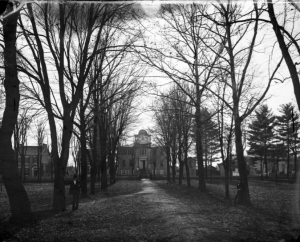
South College, c.1880. Photograph Collection, Record Group 2000.1, South College II, Archives and Special Collections, Dickinson College, Carlisle, PA.
The South College I was interested in was built in 1838 and lasted until 1927, when it was razed in order to build a new gym. I learned this information through the encyclopedia entry as well as the South College drop file in the Archives. Inside this South College was a lab, library, and museum, as well as the opportunity for students to rent rooms.

“Carlisle,” Microcosm (1881-82): 11.
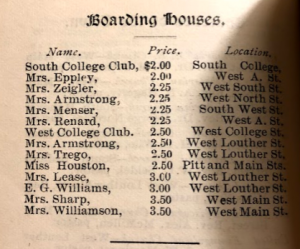
“Boarding Houses,” Student Handbook (1893-94):
Unfortunately, I learned I wouldn’t be able to see a campus-wide map of the time because maps were hardly necessary for such a small campus.
Once I realized that South College was both residential and classroom-oriented, I began to understand why Henry (Williams) Spradley had been jokingly referred to as the “Adjunct Professor of Experimental Physics.” What would have simply seemed like an odd joke now was contextualized because of my greater understanding of South College.
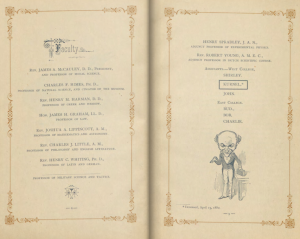
“Faculty,” Microcosm (1881-82): 5.
There was a trend among student publications to ironically assign janitors academic titles, and I found another similar instance where Henry (Williams) Spradley was identified as “Dr. Spradley,” tasked with showing students their measly accommodations in South College.

“Class of ’95,” Microcosm (1892-93): 34.
Later, he was referred to as a professor of “Bellology” and “higher Janitorology.”

“Old Dickinson” Microcosm (1895-96): 16.
In this same excerpt, a story was told from the perspective of Spradley about carrying his children to freedom during the Civil War. Again, a minstrel accent was adopted by the student authors, effectively patronizing Spradley. That aside, the story was greatly useful to my understanding of the Spradley family history. Through my genealogy work, I understood this story was most likely describing William and Elizabeth Spradley’s move to Pennsylvania, as they were both born in Virginia before appearing in the 1870 census.
Through these examples, I began to understand the relationship between the students and the Spradley family. Sometimes mocking in nature, but as other examples suggested, revering and respecting.
Henry (Williams) Spradley was described as an almost paternal figure when students lamented they “didn’t have Spradley to tuck us in.”

“’85,” Microcosm (1881-82): 192.
Furthermore, his position as a bellringer was subject of many a poem and song.
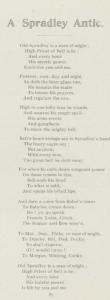
“A Spradley Antic,” Microcosm (1893-94): 87.
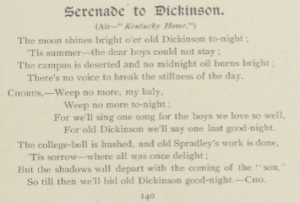
“Serenade to Dickinson,” Microcosm (1891-92): 140.
In an interesting story, “Spradley” was jokingly(?) blamed for a water poisoning. I was unable to find more evidence in the Dickinonsian or Microcosm of this, but if I had more time, I’d like to learn the entire story.
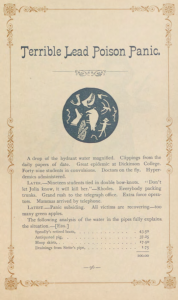
“Terrible Lead Poison Panic” Microcosm (1881-82): 96.
I feel as though Henry (Williams) Spradley was belittled in a specific way; students transformed him into a one-dimensional, dumb, “Uncle Tom” stereotype. This stereotype relied on depicting Spradley as stupid and non-authoritative, while also emphasizing his love of doing work (bell-ringing) for white students on campus.
While researching, I found myself frustrated because I know by using student-created resources, I will always struggle to find humanity in any depictions. This process led me to think carefully about how I might accidently replicate the same racism that existed in his time, and how I could afford him more respect and create a more complicated portrayal.
Moving on from Henry (Williams) Spradley, I found a variety of mentions of Shirley Spradley as well. Perhaps the most interesting and complicated portrayal was in a short science fiction piece.
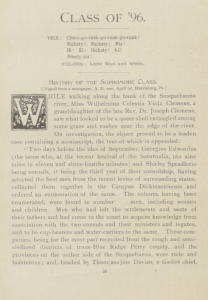
“Class of ’96,” Microcosm (1893-94): 95.
In the story, a character named “Shirley Spradlerio” is identified as a consul in the distant future of 2000 A.D. While a lot of analysis could be devoted to this piece alone, from what I could glean, the work was purposefully absurdist. The words and expressions used were other-worldly, bizarre, and confusing. The use of the Shirley Spradley’s name, I believe, then, was a testament to how Dickinson student couldn’t realistically believe a Black man like Shirley to be in any position of power in the future. I’d be very curious to hear what other opinions people may have about this, especially those with more experience in science fiction of the era.
In my searches of Shirley’s name, I found a recurring name; George Edward. He was also satirized in the science fiction piece, as well as mentioned in a variety of short reports on campus events. From what I read, I was led to believe he may have been another member of the janitorial staff, or in a similarly low ranking position. I couldn’t find any more information about him in online House Divided or Archives searches.
“Calendar” Microcosm (1895-96): 265.
Another unsolved mystery I ran into – a man named Shirley referred to on a first-name basis. In one instance, a reference was made to “Shirley’s dog,” and in another, to a man who passed out “college bills.” I think a strong case could be made that this was referring to Shirley Spradley, as these references would be sensical for Shirley as a janitor employed at Dickinson. But I wouldn’t say this with 100% certainty.

“Class of 96” Microcosm (1894-95): 40.

“Calendar” Microcosm (1897-98): 257.
Lessons Learned
Through my research at the Archives, I was able to gain a larger picture of the Spradleys’ lives. I was overwhelmed by how much information I found, and summarizing/creating a narrative was a point of difficulty for me. I found a lot of use in the student publications, but I think my narrative could have been stronger if I had found more sources (faculty minutes, catalogues, etc.) From this experience, I have a greater appreciation for time management and balancing research priorities and interests. There were a lot of threads I would have liked to follow further, but couldn’t because of how I structured my time. These lessons will be useful for me as I continue my research at the Historical Society, and generally as a historian.
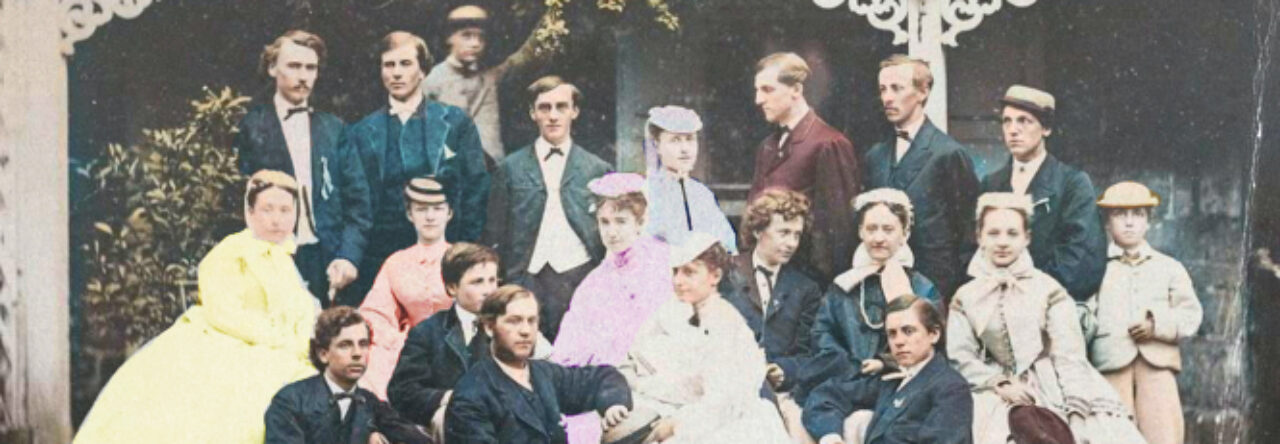
Leave a Reply